Hilarious and Silly Exam Answers You Have to See
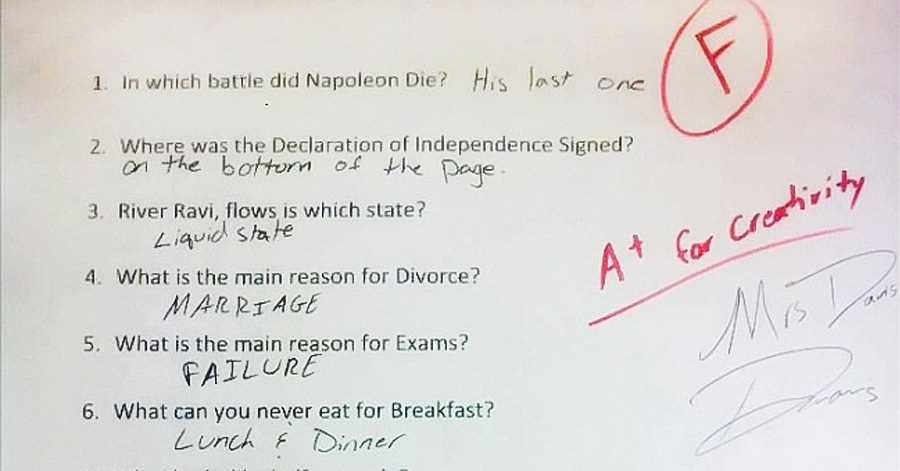
Tests and assessments often bring out the best–and sometimes the most unusual–reactions from students. While most strive for accuracy, others bring a level of creativity that defies conventional expectations. In this section, we explore some of the most amusing and unpredictable moments that can occur during an academic evaluation.
It’s not uncommon to come across responses that range from the quirky to the outright absurd. These moments highlight how students, under pressure, can think outside the box in the most unexpected ways. What starts as a straightforward task can quickly turn into a source of entertainment for anyone who has the pleasure of reviewing the results.
Whether it’s through misunderstood questions, clever tricks, or pure imagination, the creativity shown in these responses often leaves us in stitches. While the intention behind these submissions may not always align with the task, the humor and originality are undeniable, making them a memorable part of the learning experience.
Funny Moments in Exam Responses
During academic evaluations, there are always those rare moments when a student’s response stands out for its unexpected humor. These instances, though not always correct, offer a glimpse into how creativity and wit can make an appearance even in the most serious of settings. What makes these moments memorable is the surprise factor–the ability of students to take a seemingly straightforward question and twist it into something hilarious.
Below are some of the funniest moments from tests, where answers deviated far from the expected:
- When a student was asked to describe the process of photosynthesis, they answered: “Plants eat sunlight and make salad.” A creative take, albeit inaccurate!
- On a history exam, the question asked for the main causes of World War II. One student wrote: “Hitler was really mad and wanted to take over everything.” A simple but surprisingly honest take on a complex issue.
- A question on the water cycle prompted a student to respond: “The water falls from the sky, goes down the drain, and ends up in the ocean, where it starts to think about its life choices.” Certainly a thoughtful answer!
- For a math problem requiring the student to calculate the area of a circle, one student humorously replied: “Pi is 3.14159, and I don’t know why anyone would care about a pie that much.” An answer that’s both mathematically sound and funny.
These moments serve as a reminder that the pressure of assessments can sometimes lead to unexpected humor. Even when the answers don’t meet the standards set by the subject, the creativity and laughter they bring make the whole experience a little lighter.
Unbelievable Answers from Students
Occasionally, students deliver responses that are so far from the expected that they leave both teachers and classmates in disbelief. These moments, though often unintentional, demonstrate a remarkable level of creativity or a complete misunderstanding of the task. What makes these responses unforgettable is their sheer audacity, and in some cases, their humor and originality shine through, even if the facts are completely off-base.
Here are a few examples of answers that will leave you wondering how they even came to mind:
- A question about the capital of France prompted one student to write: “The capital is Paris, but it might be Paris Hilton.” While not geographically accurate, it certainly added a twist!
- When asked to explain the theory of evolution, a student responded: “People evolved from potatoes because we both have eyes.” Not quite the scientific explanation expected, but an answer that’s hard to forget.
- For a question about the Pythagorean theorem, a student wrote: “A squared plus B squared equals C squared. If you don’t believe me, try it yourself!” A bold approach, though lacking in detail and proof.
- A history question about the Industrial Revolution received the response: “It was a time when machines did all the work and people just played video games.” A clear mix-up of centuries, but an interesting interpretation of modern life.
These answers highlight the unpredictability of student responses, where sometimes, the creativity displayed is just as memorable as the correct information. While they may not be academically sound, they certainly make for entertaining reading and reflect the surprising directions the human mind can take under pressure.
Creative Yet Wrong Exam Solutions
Sometimes, students’ imaginative responses to questions are so creative that they stand out, even if they are completely incorrect. These moments reveal how resourceful students can be under pressure, often coming up with inventive, though inaccurate, solutions to complex problems. While these responses may not meet academic expectations, their originality is undeniable and can provide a good laugh.
Unexpected Twists on Simple Questions
- When asked about the process of digestion, one student wrote: “Food is swallowed, then it gets eaten by tiny robots inside the body.” While this concept may be far from biological reality, it certainly makes digestion sound like an exciting adventure.
- For a math problem involving fractions, a student answered: “Half of a half is half a half. It’s all the same.” A creative attempt, but the calculations didn’t quite add up.
- A history question about the Roman Empire got a response: “The Romans invented pizza, which is why we still call it Roman food today.” While the Romans contributed much to modern civilization, pizza was a much later creation.
Imaginative Responses to Science and Logic
- A student, when asked about the water cycle, explained: “Water goes up into the sky, gets into clouds, then falls as rain. But when it gets too bored, it evaporates back into space.” A wonderfully colorful take, but it doesn’t quite match the scientific facts.
- On a physics question about gravity, one response was: “Gravity is the force that makes everything fall towards the ground… except for balloons, they go up because they have their own force.” A novel explanation, even if it’s missing the proper principles of buoyancy.
- Asked about the structure of the atom, a student wrote: “Atoms are like tiny solar systems, with electrons as planets and neutrons as the sun that keeps them spinning.” Though not quite right, this answer paints a vivid picture.
These solutions, while far from correct, show how students’ minds work in unique ways when faced with challenging questions. Sometimes the most outlandish responses are the ones that stay with us long after the test is over.
When Humor Strikes During Tests
There are moments when the pressure of a test leads students to respond in ways that are as amusing as they are unexpected. In some cases, humor emerges as a defense mechanism, providing a brief escape from the stress of answering difficult questions. Whether it’s through clever wordplay, absurd explanations, or playful sarcasm, these moments bring a lighthearted touch to an otherwise serious situation.
Some students can’t resist the urge to inject humor into their responses, even if it’s not quite what the instructor was looking for. These creative moments of wit often stand out, creating memorable experiences for both the student and anyone reviewing the results.
- One student, when asked to identify the main characters in a novel, wrote: “The main character is the plot twist. But the villain is the homework due the next day.” A mix of humor and honesty, even if it’s a bit off-topic.
- Asked to explain the process of cell division, another student answered: “Cells split because they want their personal space. It’s the only way to keep things from getting crowded.” Not a biological explanation, but certainly amusing.
- In a geography question about mountain ranges, a student wrote: “Mountains are just Earth’s way of getting a makeover. It’s like a facelift for the planet.” A funny interpretation of geological activity, though not entirely factual.
These humorous responses remind us that even in high-stakes situations, laughter can emerge. It’s a testament to the students’ ability to find lightness in challenging circumstances, and often, their humor provides a welcome break from the rigidity of traditional assessments.
Unexpectedly Hilarious Exam Mistakes
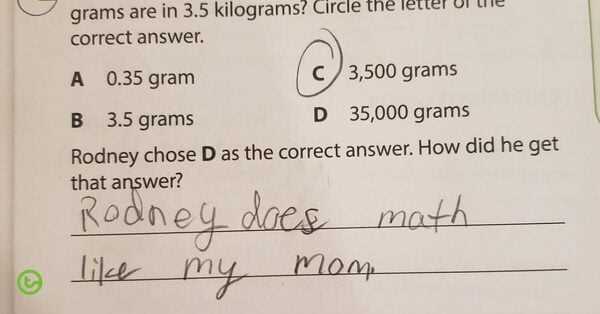
There are moments in academic assessments when students make mistakes so far from the intended response that they become an amusing spectacle. These missteps often reflect a complete misunderstanding of the question or concept, but what makes them truly entertaining is how far off the mark they can be. While the mistakes themselves are unintended, the humor in these responses comes from their unexpectedness and the creativity involved in arriving at such conclusions.
Comical Misunderstandings
- When asked to list the planets in our solar system, one student wrote: “Earth, Mars, Venus, and the rest of the stuff that doesn’t matter.” A surprisingly blunt and humorous take on planetary importance.
- A question about famous scientists led one student to respond: “Albert Einstein invented electricity, right? Because everything electric is named after him.” While it was a historical error, it certainly showed a creative connection.
- For a history question asking for the causes of World War I, a student answered: “People didn’t like each other, and they decided to fight it out.” A simplistic yet surprisingly straightforward interpretation.
Unintentionally Funny Definitions
- Asked to define the term “metamorphosis,” one student wrote: “It’s when a caterpillar changes into a butterfly, but first, it needs a good night’s sleep.” A humorous yet completely inaccurate addition to the life cycle process.
- When asked to explain gravity, a student answered: “It’s the thing that makes everything fall to the ground, unless you’re a superhero, in which case you just ignore it.” A comically unconventional interpretation of natural laws.
- For a question about the causes of the American Civil War, one student wrote: “It was all because of bad haircuts and worse fashion choices.” A historical mishap, but an answer that certainly made people laugh.
These responses stand out not for their academic accuracy, but for their unexpected humor. They remind us that, in the midst of stressful tests and pressure, students can find ways to add some levity to the situation–even if it’s through completely misguided but hilarious mistakes.
Students Get Creative in Their Responses
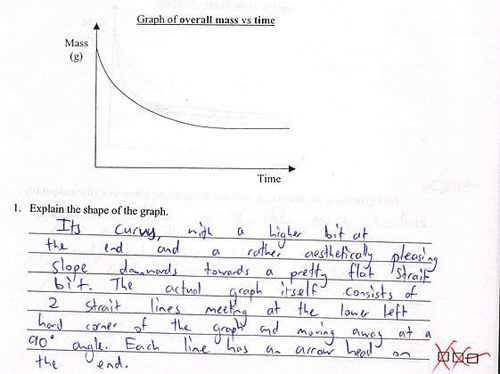
When faced with a difficult question, some students choose to think outside the box rather than follow traditional solutions. These moments of creativity, whether intentional or not, often lead to responses that are both original and unexpected. While these creative approaches may not always be factually accurate, they demonstrate the imaginative thinking that students bring to problem-solving–even when the task is far from easy.
Imaginative Solutions to Complex Problems
- Asked to describe the process of photosynthesis, one student wrote: “Plants make food by capturing sunlight and turning it into a smoothie.” A fresh perspective on a scientific process.
- For a math problem involving the Pythagorean theorem, another student answered: “If you want to make a right triangle, you need three sides, two of which must be good friends and willing to work together.” A creative, if not entirely accurate, explanation.
- A science question about the water cycle received a response: “Water goes up, gets cold and bored in the clouds, and then comes down to visit us as rain.” A whimsical approach to a natural process.
Humorous Yet Thoughtful Interpretations
- In response to a question about the Battle of Hastings, one student wrote: “William the Conqueror didn’t just win a battle, he also won a new house.” A light-hearted take on a significant historical event.
- Asked to explain the causes of climate change, another student replied: “Humans keep hitting the ‘pause’ button on nature, and now it’s stuck in fast-forward.” An insightful, if somewhat metaphorical, interpretation.
- For a question on chemical reactions, one student wrote: “When you mix stuff together, it’s like a science party where things start dancing.” A creative spin on a basic scientific concept.
These creative responses highlight the students’ ability to inject humor and originality into their work, offering a glimpse into their unique thought processes. While not always scientifically or historically accurate, these solutions add a personal touch to the test-taking experience, showing that there’s often more than one way to approach a problem.
How Wrong Answers Turn into Jokes
Sometimes, when a student’s response is far from correct, it ends up becoming a source of humor for everyone involved. These unintended mistakes, rather than being viewed negatively, can often be turned into amusing anecdotes or jokes that bring laughter to the classroom. What makes these blunders so memorable is how they highlight the gap between the student’s thought process and the expected answer, offering a humorous twist on a seemingly serious situation.
When Mistakes Become Comedy
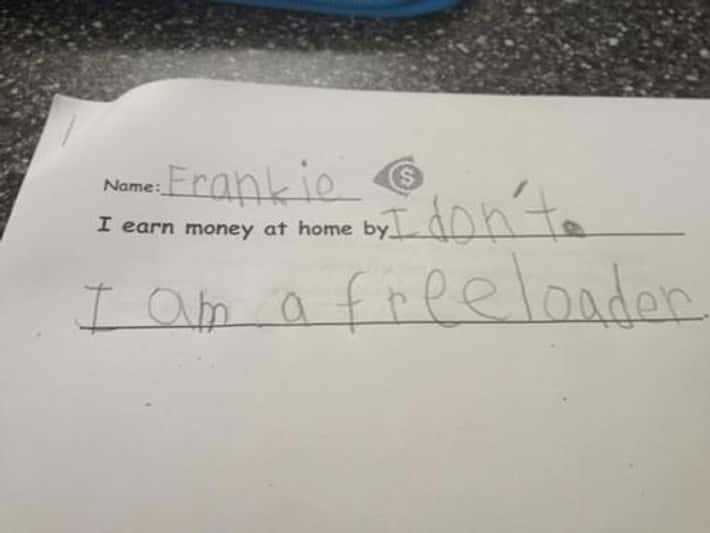
- One student, when asked to name the main characters of a novel, wrote: “The main character is the plot twist, and the villain is stress.” A funny misinterpretation that turned a standard literature question into a commentary on modern life.
- For a question about the causes of the Civil War, another student wrote: “It was because everyone was tired of being told what to wear.” While clearly wrong, it’s a humorous way to interpret a complex historical event.
- Asked to define the term “metaphor,” a student answered: “It’s like when a lion is a chair.” A nonsensical response, yet one that’s so absurd it brings a smile.
Transforming Errors into Laughs
- In response to a geography question about mountain ranges, one student wrote: “Mountains are just big lumps of Earth trying to get taller, like kids in class trying to see over the heads of the people in front of them.” A creative yet entirely incorrect take on geology.
- When asked about gravity, a student responded: “Gravity is like the Earth giving everything a big hug and pulling them down.” While not scientifically sound, it’s a charming, humorous interpretation of a natural force.
- A student, when asked how photosynthesis works, answered: “Plants make their own food by inviting sunlight over for dinner.” A quirky metaphor, turning a biological process into a friendly gathering.
These missteps show that, sometimes, wrong responses don’t just reflect a lack of knowledge but also creativity and humor. What was once an incorrect answer can quickly evolve into a joke that lightens the mood, turning a stressful task into something to laugh about.
Laughable Misunderstandings on Exams
Sometimes, students’ responses to questions miss the mark in such a way that they become genuinely amusing. These misunderstandings often arise from a mix of misinterpretation, overthinking, or simply an unexpected twist in logic. What makes these mistakes so entertaining is the way they completely miss the intended meaning, offering a glimpse into how students’ minds work under pressure. Though incorrect, these responses are often so outlandish that they bring a smile to anyone reading them.
- When asked about the causes of World War II, one student wrote: “The war started because everyone was tired of waiting for the Wi-Fi to connect.” A humorous but completely misplaced connection to a global conflict.
- For a math problem involving fractions, another student answered: “If 2/3 of a pie is eaten, the rest is probably just crumbs.” Not the most accurate, but certainly a creative, if not entirely mathematical, response.
- A science question about the human digestive system was met with: “Food goes into your stomach, but if you don’t like it, you can send it back.” A mix-up that shows a misunderstanding of how digestion works–though amusing in its own way.
Unexpected Takes on Simple Concepts
- Asked to describe a mammal, one student wrote: “A mammal is a type of animal that likes to wear fur coats and drink coffee.” A fun but entirely incorrect take on the classification of mammals.
- In a history test about ancient civilizations, a student answered: “The Egyptians were famous for their pyramids, and also for inventing the vacuum cleaner.” A laughable leap in logic, as much as we’d love to think ancient Egyptians had cleaning gadgets.
- For a question about the structure of the Earth, one student wrote: “The Earth is made of pizza layers, with crust on the outside and cheese in the middle.” A creative misunderstanding that certainly makes geology sound a lot more appetizing.
These misunderstandings, while far from the correct answer, add a layer of humor to the academic process. They highlight how the stress of assessments can lead to some unexpected and laughable interpretations, turning a stressful moment into a moment of light-heartedness.
Surprising and Comical Test Responses
Sometimes, students manage to surprise everyone by coming up with responses that are as unexpected as they are funny. These moments often occur when a student takes a completely different approach to a question, leading to answers that defy expectations and provide plenty of laughs. Whether due to a wild interpretation, an accidental mix-up, or just sheer creativity, these responses can add a moment of humor to an otherwise serious situation.
- When asked to define a “triangle,” one student answered: “A triangle is a shape with three sides, like a pizza, but without the cheese.” A surprising analogy that might be more appropriate for a food-related discussion.
- For a history question about the Roman Empire, a student wrote: “The Romans were known for their contributions to architecture, like the invention of spaghetti.” A comical mix-up that combined history with a classic Italian dish.
- A science question about the water cycle was met with: “Water evaporates from the ocean, gets really mad in the clouds, and then pours down as rain to cool off.” A creative take on meteorological processes, though not quite accurate.
Humorous Missteps with Simple Concepts
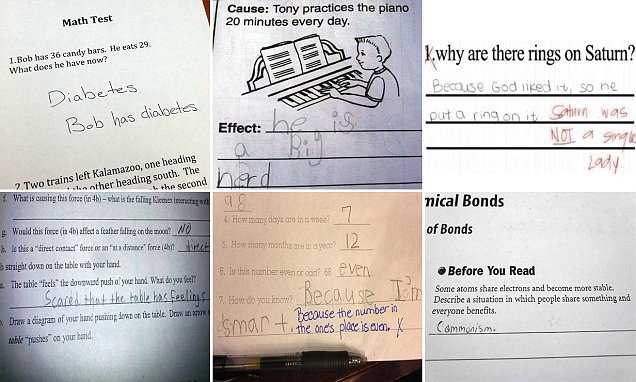
- Asked to list the five senses, one student wrote: “Sight, smell, hearing, taste, and the ability to make a good sandwich.” A surprising but humorous addition to the traditional list.
- In response to a question about the function of the heart, one student wrote: “The heart pumps blood, but it also sings songs when it’s happy.” A comical and imaginative explanation of the organ’s role.
- For a math problem involving multiplication, a student responded: “If I multiply two numbers together, I get an answer. Simple, right?” While the answer was far from useful, the simplicity of the explanation brought a smile.
These comical test responses may not have earned top marks, but they certainly succeeded in providing some levity. They remind us that sometimes, even in academic settings, humor can break through and offer a refreshing perspective on even the most straightforward questions.
Weird Answers That Will Make You Smile
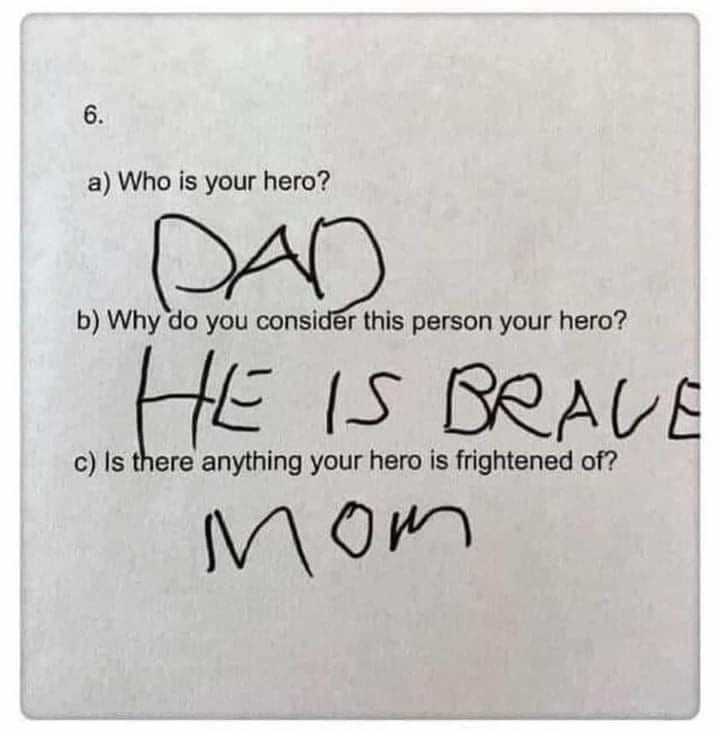
Sometimes, students provide responses that are so strange and unexpected that they not only miss the mark but also manage to brighten the day. These unusual interpretations come from a mix of overactive imaginations, quirky thinking, or simple misunderstandings. While these answers may not be what the instructor was hoping for, they often turn into amusing moments that make everyone chuckle. Below are some of the most peculiar and entertaining answers that have made their way into the academic world.
| Question | Response |
|---|---|
| What is the capital of France? | Paris is the capital of France. But I would say it’s also a place where the Eiffel Tower loves to hang out. |
| Describe the process of photosynthesis. | Plants eat sunlight and then burp out oxygen. It’s kind of like a plant’s version of lunch. |
| What causes the seasons? | Earth is just doing a slow dance around the sun, and sometimes it just gets too hot or too cold. |
| What is a polygon? | A polygon is a shape with too many corners to count. It probably gets confused at parties. |
| What is the function of the liver? | The liver filters the blood. It’s like a super-secret agent that keeps everything running smoothly. |
These oddball responses may not have been what the teachers were expecting, but they certainly serve as a reminder that even in the most serious moments, humor can find its way in. From misunderstandings to bizarre explanations, these quirky answers show how creative and amusing students can be under pressure. While they may not always be correct, they certainly have the ability to bring a smile to anyone who reads them.
Funny Failures in Academic Assessments
In the world of academics, not every response leads to success. Sometimes, students’ attempts to answer questions fall hilariously short of the mark. These failures often arise from misinterpretations, confusion, or simply an overabundance of creativity. While these mistakes may not win any points, they certainly provide plenty of laughs and remind us that humor can emerge even from the most frustrating situations. The following are some of the funniest examples of how things can go off track during assessments.
When Logic Goes Astray
- When asked to define the term “democracy,” one student wrote: “Democracy is when everyone votes for pizza toppings, and the majority wins.” While not the most accurate definition, it certainly captures the essence of decision-making in a humorous way.
- For a question about the causes of the American Revolution, a student responded: “The American Revolution happened because the colonists were mad about taxes and because everyone loves a good tea party.” A creative twist on the historical events, though not quite the explanation expected.
- Asked to explain the process of digestion, a student answered: “Digestion happens when food enters your body and gets digested by tiny robots inside you.” A very imaginative, albeit incorrect, take on human biology.
Outlandish Responses to Simple Questions
- For a math question asking for the area of a square, one student wrote: “The area of a square is the number of corners it has, so 4.” An unexpected yet charming approach to geometry.
- In response to a history question about the fall of the Roman Empire, a student answered: “The Romans fell because they tripped over their own sandals.” A funny and completely incorrect answer that surely brightened the teacher’s day.
- When asked what “convection” means in a science test, a student wrote: “Convection is when you stir a pot of soup really fast, and it all mixes up.” A misunderstanding of the scientific term, but definitely an amusing interpretation.
These funny failures are a testament to the unpredictable nature of assessments. They highlight how, in moments of pressure, students can come up with creative (albeit incorrect) responses that add humor to the academic environment. While these answers might not have scored high marks, they undoubtedly succeeded in providing a laugh.
Unexpected Comedy from Exam Papers
Occasionally, the pressure of an assessment can lead to surprising moments of humor. When students face a challenging question, some respond with answers that are so far off the mark they become unintentionally funny. These unexpected bursts of comedy come from creative, and sometimes completely misguided, attempts to answer. Whether it’s an attempt at humor, a complete mix-up, or a wild interpretation, these responses show how laughter can emerge even in the most stressful of academic situations.
Some responses are simply the result of a student’s imaginative thinking. In an attempt to answer a science question, a student might describe the process of respiration as “the lungs breathing in air and exhaling happiness.” Although far from accurate, it certainly paints an amusing mental picture. Others might tackle a math problem with an overly simplified explanation, such as claiming, “Math is just numbers adding up to make things easier,” which, while not entirely helpful, gives a humorous perspective on the subject.
In some cases, the humor comes from misunderstanding the question itself. A student who was asked about the causes of World War II responded: “World War II happened because the whole world forgot to share.” While the actual causes are much more complex, this answer is a charming oversimplification that adds a lighthearted spin to a serious topic.
These comedic moments remind us that exams aren’t just about knowledge – they can also provide unexpected moments of joy. Even when students miss the mark, their attempts can leave a lasting impression and, sometimes, a good laugh for those grading the papers.
How Students Bring Humor to Exams
When faced with a test, some students find unique ways to lighten the mood and inject humor into their responses. Rather than getting bogged down by pressure, these individuals take a playful approach, often turning serious questions into moments of comedy. From witty remarks to playful misunderstandings, these attempts at humor can not only make the grading process more enjoyable but also offer a brief respite from the stress of the academic world. The following table illustrates a few creative ways students have made their answers a bit more entertaining.
| Question | Response |
|---|---|
| What is the capital of Spain? | Madrid is the capital, but I think it’s also where they make the best churros. |
| Explain the concept of photosynthesis. | Photosynthesis is when plants eat sunlight, turn it into energy, and then have a mini party inside themselves. |
| What is the purpose of the mitochondria? | The mitochondria are like the powerhouse of the cell, except without the electricity and with more mitochondria-related activities. |
| What is the meaning of “democracy”? | Democracy is when everyone votes for the best pizza topping and the majority wins. |
| Why is the Earth round? | Earth is round because that’s the best shape for keeping all the continents in one place. Also, it rolls really well. |
Students who bring humor into their responses often do so to break the tension of an otherwise high-pressure situation. These attempts, while sometimes incorrect, reflect a lighthearted way to approach stressful tasks. Whether it’s using funny metaphors, offering creative interpretations, or simply making a joke, humor can add a touch of personality to a test. It shows that even in academic settings, there’s always room for a little laughter.
Strange and Hilarious Exam Responses
Sometimes, students’ creativity leads to answers that are as amusing as they are unexpected. These responses often arise when students misinterpret the question or decide to take a wildly imaginative approach. While these answers may not provide the correct information, they can certainly provide moments of laughter. The odd and comical nature of these responses shows just how unique the human mind can be when under pressure. Below are a few examples that capture the charm of unexpected, and often hilarious, student responses.
- When asked to define “gravity,” one student wrote: “Gravity is the thing that makes things fall, unless you’re in space, then it just doesn’t care.” This quirky interpretation shows a creative but incorrect understanding of the concept.
- A student who was asked to explain the term “ecosystem” replied: “An ecosystem is when animals live together in harmony, like a really big zoo.” Though not a precise definition, it gives a lighthearted view of the environment.
- In response to a question about the importance of the Industrial Revolution, one student answered: “The Industrial Revolution was important because it made all the machines work harder, and they liked it.” This interpretation takes an anthropomorphic turn, attributing feelings to inanimate objects.
- Asked to explain the process of evolution, one student responded: “Evolution happens when animals get tired of their old selves and decide to change into something cooler.” This simplification is amusing, yet still highlights the basic idea of change over time.
- For a question about the causes of the French Revolution, a student wrote: “The French Revolution happened because people didn’t like their king’s fashion choices.” Though historically inaccurate, it adds a humorous twist to a serious event.
These strange and humorous responses reflect the way students’ minds work under pressure. Sometimes, the desire to make the test more entertaining leads to responses that are unexpected, odd, and, at times, outright hilarious. While they may not provide the right information, they certainly make the grading process more fun and showcase a student’s ability to think outside the box, even if it means going completely off course.
Humorous Errors Students Make on Tests
Sometimes, the pressure of an assessment leads students to make errors that are more amusing than anything else. These mistakes often come from a misunderstanding of the question, a misremembered fact, or simply a moment of creativity gone wrong. While these errors don’t reflect the correct information, they can certainly provide some comic relief for both the student and the grader. Below are a few examples of humorous mistakes that have made their way into test papers.
- Misunderstanding the question: When asked to list the main causes of World War I, one student answered: “World War I happened because people forgot to write their homework on time.” While a creative response, it’s a far cry from the actual causes of the war.
- Over-simplification: Asked to explain the concept of a “democracy,” a student wrote: “Democracy is when everyone gets to vote, except when they’re too tired.” While it highlights the voting aspect, it doesn’t quite capture the full meaning.
- Creative liberties: When asked to explain how plants reproduce, one student wrote: “Plants have a huge party every spring and invite insects to help them out.” A humorous, yet totally incorrect, view of the process!
- Literal interpretations: A student answering a question about the water cycle responded: “Water evaporates and then goes on a vacation to the clouds before coming back to visit us.” This lighthearted response, though inaccurate, offers an amusing view of the natural process.
- Unexpected connections: In a history test, a student was asked to explain the impact of the Renaissance. They wrote: “The Renaissance was when people stopped wearing armor and started painting their faces.” Though an odd connection, it shows a unique perspective on the period.
These humorous errors are reminders that sometimes, students’ creativity and sense of humor can shine through, even when they are making mistakes. Though they may not offer the correct answers, these responses provide a fun break from the usual academic rigors and show the lighter side of learning. After all, everyone can appreciate a good laugh, even in a classroom setting.
Exams Gone Wrong in the Funniest Way
It’s not uncommon for students to find themselves in the middle of an assessment where things just don’t go as planned. Sometimes, these moments lead to some truly hilarious situations, where the attempt at providing the right answer turns into a comedic disaster. Whether it’s a complete misunderstanding of the question or a misstep in the process, these instances bring a lighthearted twist to the otherwise serious atmosphere of a test. Below are a few memorable cases where things went hilariously wrong.
Unexpected Mix-Ups
| Scenario | Response |
|---|---|
| Question about the solar system | “The solar system is just one giant space party, and Earth is the guest of honor.” |
| History question about Napoleon’s downfall | “Napoleon lost because he didn’t have a good enough GPS to find Russia.” |
| Mathematics problem on fractions | “I don’t know how to divide fractions, but I’m pretty sure they’re like cake slices–you just keep cutting.” |
| Geography question about the continents | “There are seven continents, and Antarctica is the one with the penguins. I’m sure of it.” |
Creative Misunderstandings
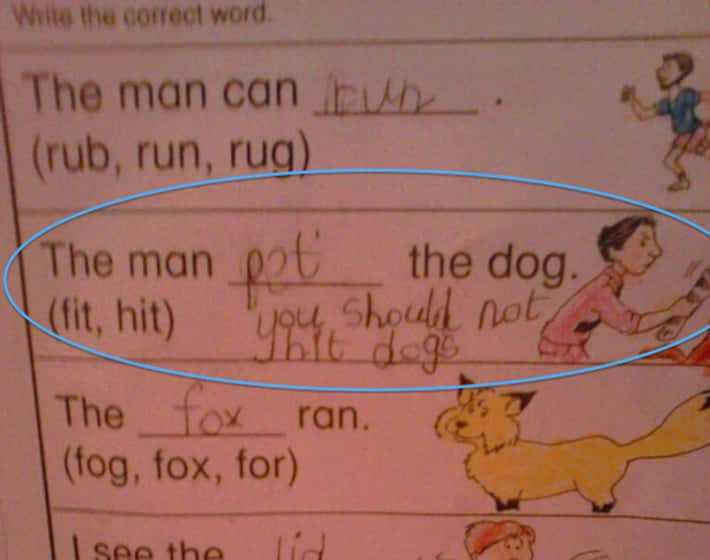
Sometimes, the confusion is so great that the answers go in a completely unexpected direction, turning a simple question into a work of pure creativity.
- When asked about the causes of the American Civil War, one student wrote: “The Civil War was caused by a really bad game of Monopoly.” While obviously incorrect, the creative comparison is certainly funny.
- For a chemistry question about acids and bases, one student replied: “Acids are like bad moods and bases are like good moods; both are necessary but you need to balance them for peace.” A humorous way to approach a technical concept, even if it’s scientifically inaccurate.
- In response to a question about Shakespeare’s works, a student answered: “Shakespeare wrote plays to make people cry or laugh, sometimes both at the same time, like a reality TV show.” Though not historically accurate, it certainly captures the essence of dramatic effect in a fun way.
These funny moments show that sometimes the process of thinking under pressure can lead to the most unexpected and comical answers. While not helpful in terms of grading, they add a layer of humor to what might otherwise be a stressful situation. It’s a reminder that even when things don’t go as planned, laughter can often be found in the most unexpected places.